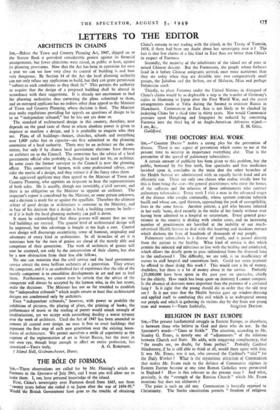THE DOCTORS' REAL WORK Sm,—" Country Doctor " makes a
strong plea for the prevention of disease. There is one aspect of prevention which seems to me at the present time to outstrip in importance everything else. That is the prevention of the spread of pulmonary tuberculosis. A certain amount of publicity has been given to this problem, but the public, bemused by the free teeth, free spectacles and free medicines lavished upon it, concludes in the main that the other branches of the Health Service are administered with an equally lavish hand and are efficiently run. There are only two classes who realise vividly how far this is from being the case—the general practitioners who enter the homes of the sufferers and the relatives of those unfortunates who contract pulmonary tuberculosis. Every week I visit a man in the advanced stage, of the disease who coughs continually, whose sputum contains tubercle bacilli and whose son, aged thirteen, approaching the peak of susceptibility, lives in the same house. Another patient, a girl who became infected in her early 'teens, died recently in the midst of her family without ever having been admitted to a hospital or sanatorium. Every general prac- titioner in the country is dealing with similar cases, and an increasing number of practitioners arc horrified at the inability of our much- advertised Health Service to deal with this haunting and insidious menace which darkens the lives of hundreds of thousands of our people. Pulmonary tuberculosis is a disease of youth, and is passed directly from the patient to the healthy. What kind of service is this which permits the infected and infectious to live with the healthy and uninfected, which allows the deadly germ to pass unhindered from the diseased lung to the undiscascd ? The difficulty, we arc told, is an insufficiency of nurses to staff hospital and sanatorium beds. Could not extra payment be offered to those doing this work ? This would cost a lot of money, doubtless, but there is a lot of money about in the service. Probably L15,000,000 have been spent in the past year on spectacles, chiefly for the elderly. How much has been spent on dentistry I cannot compute. Is the absence of dentures more important than the presence of a cavitated lung ? Is it right that the young should die in order that the old may see ? Is it not time that the Health Service gave up window-dressing and applied itself to combating this evil which is so widespread among our people and which is gathering its victims day by day from our young


































 Previous page
Previous page